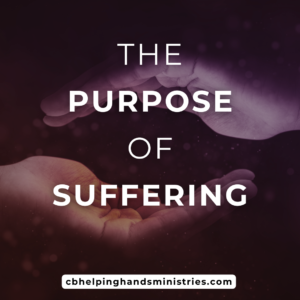The Purpose of Suffering

Suffering is a universal human experience that has puzzled and troubled people for centuries. Why does God allow suffering to exist in the world? What is the purpose of suffering? As we navigate the complexities of life, we often find ourselves asking these questions, seeking answers that bring comfort and understanding.
The Bible offers a unique perspective on the purpose of suffering. While it does not provide a simple or straightforward answer, it does provide a framework for understanding and grappling with suffering. In the book of Job, we find a powerful example of someone who suffers greatly and seeks answers from God. Ultimately, God’s response to Job is not a clear-cut explanation of why he suffered, but rather a reminder that God’s ways are not our ways (Isaiah 55:8-9).
In Romans 5:3-4, Paul writes, “We also glory in our sufferings, because we know that suffering produces perseverance; perseverance, character; and character, hope.” This passage suggests that suffering can be a means of spiritual growth and development. Through suffering, we are able to develop perseverance, which is essential for living a life that is pleasing to God.
In Hebrews 12:10-11, we read, “For our light and momentary troubles are achieving for us an eternal glory that far outweighs them all. So we fix our eyes not on what is seen, but on what is unseen. For what is seen is temporary, but what is unseen is eternal.” This passage suggests that suffering can be a means of purification, helping us to focus on things that are eternal rather than things that are temporary.
In 1 Peter 2:19-20, we read, “For it is commendable if someone bears up under the pain of unjust suffering because they are conscious of God. But how is it to your credit if you suffer in a beatific manner? But if you suffer for doing good and you endure it patiently, that is commendable before God.” This passage suggests that suffering can be a means of witnessing to others about our faith. When we suffer for doing good and patiently endure it, we are commended by God.
The purpose of suffering is not always easy to understand or accept. However, the Bible offers a perspective that suggests that suffering can be a means of spiritual growth and development, purification, and witnessing. While these purposes do not necessarily make suffering easier to bear, they do offer a framework for understanding and coping with the challenges that we face.
As we navigate the complexities of life, may we remember that God is sovereign and that He is working all things together for our good (Romans 8:28). May we fix our eyes on things that are eternal and may we find comfort in the knowledge that we are not alone in our suffering.
Apostle Shelia
SBI Ministries
C.B. Helping Hands Ministries
Follow Us
Stay up-to-date with our latest articles and insights by following us on social media:
https://www.facebook.com/CBHelpingHands
This website is a treasure trove of valuable information, and we’re committed to keeping it free for everyone. If our content has made a positive impact on your life, consider supporting us with a donation to help us continue sharing knowledge freely.


 David, the second king of Israel, is one of the most iconic figures in the Hebrew Bible. His life is a testament to God’s power and faithfulness, as well as his own courage, humility, and perseverance. In this blog post, we’ll delve into the life of David, exploring his early years, his rise to power, and his reign as king.
David, the second king of Israel, is one of the most iconic figures in the Hebrew Bible. His life is a testament to God’s power and faithfulness, as well as his own courage, humility, and perseverance. In this blog post, we’ll delve into the life of David, exploring his early years, his rise to power, and his reign as king.



